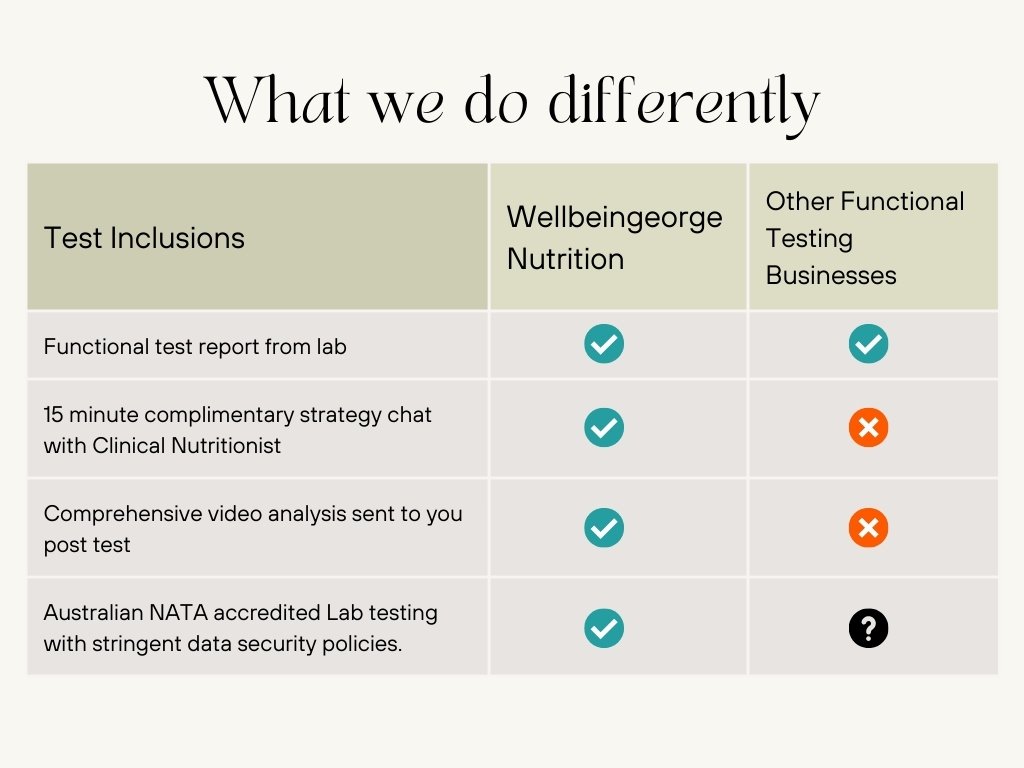
What’s the Difference Between a Nutritionist and a Dietitian?
What's the Difference Between a Nutritionist and a Dietitian?
When it comes to your health and nutrition, understanding the roles of nutritionists and dietitians can help you choose the right professional for your needs. Although these terms are often used interchangeably, there are significant differences in their education, qualifications, and areas of expertise.
What does a Nutritionist do
A Nutritionist focuses on promoting health and wellness through diet, lifestyle changes and high-strength therapeutic supplements where necessary. They provide guidance on “preventative” natural medicine, including balanced eating for different conditions, lifestyle support and nutrition education. Nutritionists work in various settings, including private practices, community health programs, corporate nutrition, fitness centers, and public health organizations. Their goal is to help clients achieve optimal health through better nutrition in a sustainable way. One of the key goals of a Nutritionist is to identify and treat the root cause of any health concerns, rather than just putting a band-aid fix on the problem.
What Degrees and Credentials Are Required for a Nutritionist?
The educational background of a Nutritionist can vary widely, as unfortunately the term “nutritionist” in Australia has not yet become regulated. Many Nutritionists hold Bachelor of Science degrees and other related fields, while others may have completed shorter certification programs. It’s essential to verify the credentials and experience of the Nutritionist you choose, and look for someone that is degree-qualified, as the information provided can vary significantly between an accredited Nutritionist and someone who is done a few short units in a Personal Training certification.
Conditions That Nutritionists Treat
Nutritionists can help manage and improve a variety of health conditions, including:
Weight management
All gut health issues, such as bloating, irregular bowels, pain, parasites, bacterial overgrowths (SIBO)
Genetic wellness and longevity support
Food intolerances and allergies
Sports nutrition
Mood, energy, sleep issues
Autoimmune conditions such as Hashimoto’s and Graves, Inflammatory bowel disease, Rheumatoid Arthritis, Coeliac disease and more
General wellness and preventive health
Why It Is Important to Seek Advice from a Qualified Nutritionist
Given the lack of strict regulation, the expertise of Nutritionists can vary significantly. Seeking advice from a qualified Nutritionist ensures that you receive evidence-based, personalised recommendations. A degree-qualified Clinical Nutritionist, like Georgina Cron at Wellbeing George, has the education and knowledge to provide effective guidance for your health needs.
What does a Dietitian do
Dietitians are healthcare professionals who specialise in medical nutrition therapy. They work in clinical settings, such as hospitals, healthcare facilities, and private practices, collaborating with other healthcare providers to manage and treat medical conditions through tailored dietary plans. Dietitians are equipped to handle complex nutritional needs and provide comprehensive care.
What Degrees and Credentials Are Required for a Dietitian?
Dietitians typically complete a bachelor's degree in dietetics, nutrition, or a related field, followed by a supervised practice program accredited by professional bodies such as the Dietitians Association of Australia (DAA). In Australia, dietitians must be registered with regulatory bodies, ensuring they meet high standards of practice and continuing education.
Conditions That Dietitians Treat
Dietitians are trained to manage a wide range of medical conditions, including:
Diabetes
Heart disease
Gastrointestinal disorders
Kidney disease
Disordered eating
The Bottom Line
Understanding the differences between Nutritionists and Dietitians can help you make an informed decision about which professional to consult for your dietary and health needs. For chronic disease management and disordered eating, a dietitian is typically the best choice due to their extensive training and ability to provide medical nutrition therapy. For preventative wellness, a qualified Nutritionist can offer valuable guidance and support in areas such as weight management, mood, sleep, energy support, gut health conditions, food intolerances and allergies, DNA and longevity nutrition and sports nutrition.





